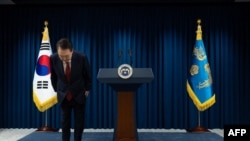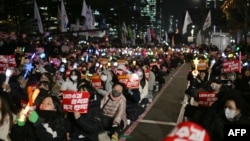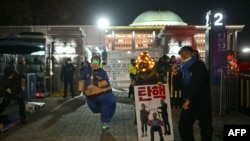South Korea’s defense ministry insisted that President Yoon Suk Yeol remained in charge of the country’s armed forces on Monday, even as the justice ministry enforced a travel ban against him following his attempt to declare martial law last week.
The developments deepened what legal scholars described as an extraordinary constitutional crisis. Although Yoon is being investigated for treason, and the head of his own party has said he would no longer be involved in state affairs, conservative lawmakers have continued to resist his impeachment, and it appeared Yoon continued to hold key levers of power as of late Monday.
When asked by a reporter how a president under suspicion of rebellion could control the country’s armed forces, a spokesperson for South Korea’s defense ministry responded: “Legally, the authority remains with the current commander in chief.”
Yoon has also continued to perform other presidential duties, such as accepting the resignation of senior officials and appointing others. The developments raise questions about what, if any duties, he has ceded, as he and his conservative allies have promised.
On Sunday, PPP chief Han Dong-hoon said that Prime Minister Han Duck-soo would handle state affairs in consultation with the party, but offered few other details about the apparent power-sharing arrangement. Neither Han holds an elected position.
PPP officials did not respond to VOA’s request for more details about the alleged deal, which numerous legal scholars have called extra-constitutional and likely illegal.
Jeon Hak-seon, a constitutional law professor at Hankook Foreign Language University, said the only established process for removing a president’s powers are impeachment or resignation.
There is no constitutional provision, Jeon said, for an arrangement in which the president voluntarily and informally entrusts his powers to another official – and certainly not an unelected one.
“Such a system does not exist,” Jeon told VOA. “The term ‘entrustment’ is not even used in Korean law.”
Another Seoul-based legal professor, who requested anonymity because of the sensitivity of the discussions, said Yoon and his party are likely trying to avoid a presidential vacancy, because under such a scenario an election must be held within 60 days, according to the constitution.
Yoon, frustrated by what he saw as opposition attempts to obstruct his governing, declared martial law late Tuesday – the first such decree since South Korea became a democracy in the 1980s. Yoon said the move was necessary to "crush anti-state forces,” but opposition lawmakers overturned the decree within hours.
In a speech Saturday, Yoon apologized for causing anxiety and said future governance “will be handled jointly by our party and the government.”
The two-minute speech was Yoon’s only public appearance since lifting the martial decree early Wednesday. South Korean opposition lawmakers failed to impeach Yoon in a vote on Saturday, but vowed to soon hold another vote.
Yoon’s office did not respond Monday to VOA’s request for clarification about what, if any, presidential powers had been ceded to the party or prime minister. Responding to a similar VOA question on Sunday, a presidential spokesperson said: “I ask for your deep understanding that we cannot help but be cautious in sending messages. However, if there is anything to say at the level of the Office of the President, we will share it without delay.”
Early Monday, the Yonhap news agency reported that many officials at the presidential office “seem to be abandoning their messaging apps or social media accounts and creating new ones, possibly in preparation for ongoing investigations by the prosecution and police.”
South Korea’s Justice Ministry on Monday announced that it had imposed a travel ban on Yoon, who faces three separate government investigations into treason for his activities related to the martial law attempt.
While in office, South Korean presidents are immune from prosecution, except in cases involving allegations of rebellion or treason. However, it remained unclear whether any law enforcement agency would attempt to question or arrest Yoon, a former chief prosecutor.
Yoon’s popularity plunged to an all-time low of 17%, according to a poll released Monday by Realmeter, a public opinion research organization. Other recent polls have put that figure much lower. Ahead of Saturday’s impeachment vote, an estimated crowd of 100,000 protesters gathered outside the country’s legislature.
Despite immense public pressure, lawmakers in Yoon’s PPP have refused to support impeachment, saying such an outcome would create instability.
The situation in some ways mirrors 2017, when South Korea's former conservative president, Park Geun-hye, was removed from office on corruption-related charges. Those developments deeply fractured the conservative party, and made some reluctant to repeat the process.
But conservatives are likely to face mounting pressure if street protests and strikes intensify and polling continues to reflect Yoon’s low popularity, said Mason Richey, professor of international politics at Hankuk University of Foreign Studies.
“Logically, the Han-Han-Yoon governing arrangement may be unsustainable, as it is apparently extra-constitutional and opens up tensions in handling state affairs,” said Richey. “Although much about this saga so far has been illogical.”


